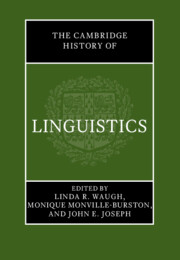Book contents
- The Cambridge History of Linguistics
- The Cambridge History of Linguistics
- Copyright page
- Dedication
- Contents
- Figures
- Tables
- Contributors
- Preface
- Acknowledgments
- Abbreviations, Acronyms, Special Symbols, and Other Conventions
- Introduction
- Part I Ancient, Classical, and Medieval Periods
- Part II Renaissance to Late Nineteenth Century
- Part III Late Nineteenth-through Twentieth-Century Linguistics
- Part IIIA Late Nineteenth Century through the 1950s: Synchrony, Autonomy, and Structuralism
- Part IIIB 1960–2000: Formalism, Cognitivism, Language Use and Function, Interdisciplinarity
- 17 Chomsky and the Turn to Syntax, Including Alternative Approaches to Syntax
- 18 Functionalist Dimensions of Grammatical and Discourse Analysis
- 19 Semantics and Pragmatics
- 20 Language and Philosophy, from Frege to the Present
- 21 Lexicology and Lexicography
- 22 Generative Phonology: its Origins, its Principles, and its Successors
- 23 Phonetics and Experimental Phonology, c. 1950–2000
- 24 Historical and Universal-Typological Linguistics
- 25 Language and Society
- 26 Language and Anthropology
- 27 Language and Psychology, 1950–Present: A Brief Overview
- 28 Semiotics
- 29 Applied Linguistics
- References
- Index
26 - Language and Anthropology
from Part IIIB - 1960–2000: Formalism, Cognitivism, Language Use and Function, Interdisciplinarity
Published online by Cambridge University Press: 20 July 2023
- The Cambridge History of Linguistics
- The Cambridge History of Linguistics
- Copyright page
- Dedication
- Contents
- Figures
- Tables
- Contributors
- Preface
- Acknowledgments
- Abbreviations, Acronyms, Special Symbols, and Other Conventions
- Introduction
- Part I Ancient, Classical, and Medieval Periods
- Part II Renaissance to Late Nineteenth Century
- Part III Late Nineteenth-through Twentieth-Century Linguistics
- Part IIIA Late Nineteenth Century through the 1950s: Synchrony, Autonomy, and Structuralism
- Part IIIB 1960–2000: Formalism, Cognitivism, Language Use and Function, Interdisciplinarity
- 17 Chomsky and the Turn to Syntax, Including Alternative Approaches to Syntax
- 18 Functionalist Dimensions of Grammatical and Discourse Analysis
- 19 Semantics and Pragmatics
- 20 Language and Philosophy, from Frege to the Present
- 21 Lexicology and Lexicography
- 22 Generative Phonology: its Origins, its Principles, and its Successors
- 23 Phonetics and Experimental Phonology, c. 1950–2000
- 24 Historical and Universal-Typological Linguistics
- 25 Language and Society
- 26 Language and Anthropology
- 27 Language and Psychology, 1950–Present: A Brief Overview
- 28 Semiotics
- 29 Applied Linguistics
- References
- Index
Summary
In 1960-80, (American) linguistic anthropology (e.g., Gumperz and Hymes , ) developed an empirical, ethnographic approach to (the details of) language (use), its social context, and variation across speakers and situations, affinities and differences. It overlapped with (Labovian) sociolinguistics — and was distinct from Chomsky’s formal, ‘universal’ approach. It defined, refined or created ‘units’ of analysis, e.g. speech community/community of practice; speech event (ethnography of communication, the SPEAKING mnemonic); everyday speech and interaction; verbal and non-verbal contextualization cues (interactional sociolinguistics); communicative habits of speakers (e.g., diglossia); indexes/indices connected to the context which help social identity formation. Thus, it defined language as a cultural practice and social resource and linked the details of performance with broader conditions of use.
In 1980-2000 interdisciplinary conversations led to new domains of inquiry: (1) language socialization: language acquisition and full participation in social groups by children and newcomers related to cultural norms, practices, attitudes; (2) language ideologies: ideas about social and linguistic relationships, linked to issues of power, politics, and economics; (3) verbal performance: creative and aesthetic uses of language and other forms of artistic expression.
Language is not a neutral medium of communication; it is embedded in social contexts and is a force that is socio-historically-politically determined.
Keywords
- Type
- Chapter
- Information
- The Cambridge History of Linguistics , pp. 806 - 832Publisher: Cambridge University PressPrint publication year: 2023



